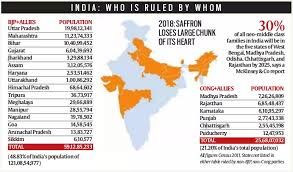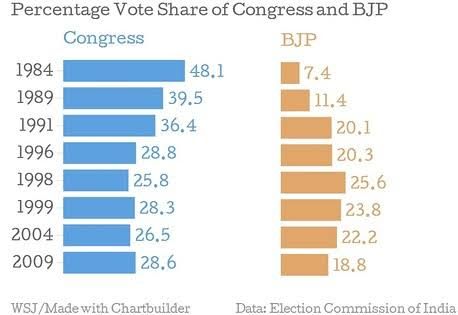Election Battle
Feb 20, 2019 • 25 views
After the BJP’s landslide victory in 2014, it took Congress a while to get hold of reality. While their defeat was evident even to the Congress, the majority that the BJP was able to garner was something no one had imagined.
When it did recover, the party experienced with a variety of positions and strategies, tried a few tactics like the “suit-boot ki sarkar” jibe which may have influenced Prime Minister Narendra Modi’s policy stances but they did little to advance Congress’s own prospects. Others, including the hiring of the former BJ P election managers, did the Congress no good. Congress’s traditional position has been that it is India’s only national party and that, therefore, it must be at the Centre of any non-BJP alliance. In 1999, when the Vajpayee government lost a no-confidence vote, the Congress refused to become part of an opposition alliance unless it led the new government.

That position now seems to have been abandoned. Congress’s view is that its major priority is to ensure that the BJP does not get a second term. It believes that India cannot afford five more years of Narendra Modi -Amit Shah rule because this would destroy Indian secularism, damage institutions, increase social tensions and finish off India that Jawaharlal Nehru and Mahatma Gandhi had envisioned.
In short, Congress is willing to do whatever it takes, in terms of alliance or power-sharing, because Congress does not want to witness BJP’s second tenure. However, some things do come out when we consider both these parties and their alliances making efforts to win the Lok Sabha elections. Firstly, for Congress, the other political parties don’t necessarily see why they should play second fiddle to a weakened Congress. After May 2014, constantly losing elections and facing beat downs at the hands of the BJP has made Congress look very weak. The question still arises on whom the Mega-Alliance will choose as its face for the upcoming elections. There is still a need for more clarity and a better strategy if they really want to win the elections.

Secondly, the BJP has spent at least two years trying to portray the next election as the main contest between Rahul Gandhi and Narendra Modi. Such is the party’s obsession with Rahul that the PM spent a large part of his speech during the TDP-sponsored no-confidence motion attacking Rahul. The BJP’S social media cells go on
and on about Pappu and the media are encouraged t0 rubbish, Rahal.
Given Narendra Modi’s stature, he may well win this contest, if Rahul is projected as the alternative. But will he do as well if he f1 gets a united opposition that draws attention to the failures of his government? A few months ago, Sonia Gandhi spoke of her concern that Congress is being perceived as a Muslim party. As if on cue, Narendra Modi asked recently if the Congress was a party of Muslim men. Ultimately, nobody can argue that Rahul Gandhi does not possess Narendra Modi’s experience or speaking skills. But, it is hard to deny that in recent months he seems to have grown in confidence, which can be of some relief to Congress but whatever it is planning, it must keep the best foot forward. The BJP is still the favourite to win the next election. But at least now, it might have a fight on its hands.
If we go by all that happened in the monsoon session, we can expect this battle to be a little more entertaining, as all the parties have had their engines in the very top gear from the very beginning.
